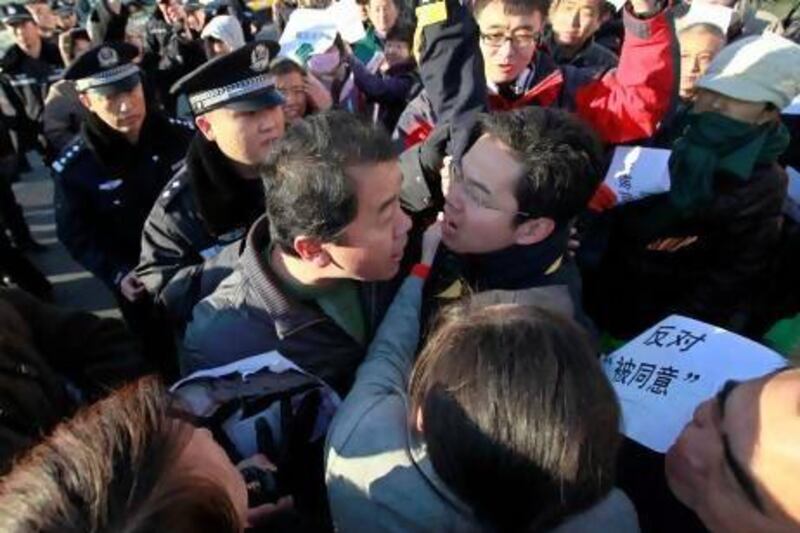BEIJING // Until last month, Ren Jianyu, a 25-year-old Chinese labour camp detainee, spent most of his waking hours folding cardboard boxes or coiling copper wire.
Meals were brief and of poor quality and evening entertainment consisted of mandatory viewing of the 7pm state news simulcast.
Ren spent 15 months in Chongqing's Fuling labour camp, losing a kilogram of body weight for each one.
Yet Ren had committed no crime. He had been found innocent of subversion - a charged brought by the prosecutors in the south-western city for forwarding and writing messages critical of the now disgraced politician Bo Xilai.
But when Ren's case did not go their way, the police sentenced him to two years of re-education though labour, or laojiao.
Established in the 50s as a quick, non-judicial way to deal with opponents to Mao Zedong's polices, laojiao is still used by local authorities to deal with drug addicts, prostitutes, gamblers and people who are perceived as challenging government authority.
People can be sentenced without trial for up to three years, while a fourth year can be added for bad behaviour.
"It is a random and fearsome system," said Ren, who was freed seven months early. "In court you can stand up for yourself but if they decided to send you to laojiao then all they need to do is produce some documents and you go."
Ren is the latest of several cases involving laojiao to have angered the public in recent months as evidenced by the outcry during demonstrations on on social media.
In August, Tang Hui, a street vendor from the central province of Hunan, was given an 18-month sentence for petitioning for harsher punishments for the men who abducted, raped and prostituted her 11-year-old daughter.
In April, an 80-year-old man was ordered to a complete a one-and-a-half year sentence for protesting the government acquisition of his land.
They were both freed within days but anger at the loajiao system has continued to grow, so much so that even state-run newspapers have called for its abolition in recent weeks.
"The laojiao system is an ulcer on the rule of law," wrote the Guangming Daily last month. "It is resolutely time to abolish it," it said, while the Beijing Evening News wrote that "a stable society cannot be built on the unlawful violation of human rights".
There are about 300 labour camps in China currently housing between 200,000 and 300,000 detainees, according to the Washington-based Laogai Research Foundation.
"Millions have passed though Laojiao since it started, the regime could not survive without it," says the foundation's director Harry Wu, himself a former Laojiao detainee. He estimates about 10 per cent of inmates are political prisoners or people who belong to banned religious organisations such as the spiritual movement Falun Gong.
While the government does not seem likely to abolish the system, it says it working on plans to reform it, but no details have been released.
In October, Jiang Wei, the official charged with overseeing judicial reform in China, said that while the camps play an important role in maintaining social order, "there is a widespread agreement in the society that reforming the re-education-through-labour system is needed".
China's ruling Communist party has been wrestling with the wider issue of judicial reform for years. The lack of an independent judicial system is frequently cited by international organisations as one of the biggest obstacles to doing business in China, while Chinese citizens frequently take to the streets to get justice because they do not trust the courts.
Relinquishing its hold on the courts, however, would leave the party in a weaker position.
One of the reasons for Ren's early release was that he was sentenced while Bo Xilai was in charge of Chongqing. Bo has since been found guilty of abuse of power and corruption by an internal party investigation and was stripped of all of his party posts. In August, his wife was found guilty of murdering British businessman Neil Heywood.
Ren has also been allowed to sue the Chongqing authorities for incarcerating him, a case that will probably be heard this week.
He is also hoping to clear his name and to get compensation for lost job opportunities. Before his arrest, Ren was a village official who was on the verge of joining the civil service.
In a wider sense though, his case might knock a brick out of the wall that is the laojiao system, say lawyers.
"It is possible to abolish laojiao if people keep questioning it - keep appealing their cases" says Beijing-based human-rights lawyer Li Fangping.
foreign.desk@thenational.ae





